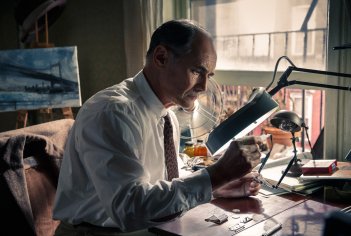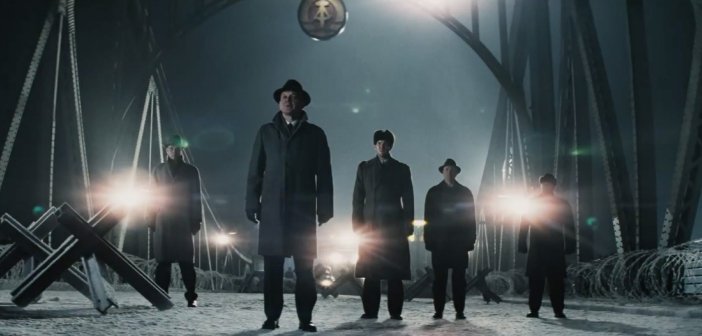Oscar Watch | Why Bridge of Spies Should Win Best Picture
Cinema in 2015 was dominated by wide-screen, jaw dropping moments that reminded you just how much awe and wonder the medium can inspire. The best picture race this year has, surprisingly, reflected this. While there are the usual talk-y dramas that normally vie for the award, this year sees a number of films nominated that feature incredible visual set pieces that only the most talented of filmmakers could pull off. Obvious examples of this include Tom Hardy’s showdown with the Doof Warrior at the end of Mad Max: Fury Road or the rescue sequence at the conclusion of Ridley Scott’s The Martain. More Oscar friendly movies also featured big brassy set pieces, such as Lenny Abrahamson’s depiction of captivity in Room, or the various visual thrills in The Revenant. For my money though the single best set piece in any film last year is the opening sequence to Steven Spielberg’s Bridge of Spies, a historical drama where Tom Hanks attempts to ensure that a Soviet spy gets a fair trial in 1950s America.

Over the course of about ten intense minutes, the viewer follows Russian artist-cum-spy Rudolf Abel as he rides the subway and paints for a while in a Brooklyn park. It couldn’t be further from an action scene, and yet it’s edge of your seat, nail-bitingly thrilling. Sure, Abel is being trailed by FBI agents, but there’s never any hint that violence might occur. The FBI agents that track him are shown to be completely human – they worry about losing him in a rush hour crowd and when they finally catch up with him they’re content to quietly park their car and watch him paint. Spielberg’s secret weapon has always been his use of sound, and while this scene is near wordless, its noisy; cars honk, trams wheez and crowds roar. This adds huge dimensions to its sense of realism. The scene ends with Abel emerging, in just his underpants, from his bathroom when his flat is raided, meekly asking if he can put his false teeth in. Simultaneously it is utterly disarming and completely arresting. The entire scene is a love letter to cinema, and it’s likely a sequence only Steven Spielberg could pull off.
To paraphrase the BBC’s Mark Kermode; Speilberg has always been a better filmmaker when he’s selling popcorn than when he’s pontificating. His big important movies, those which tackle social themes and issues, over the course of a few hours, quite often tend to be po-faced and emotionally draining. Excellent films, sure, but not films that you’d tend to revisit. Big blockbusters seem to be his real vocation. These films, aside from being technical marvels, pushing the boundaries of what can be done on screen, are often one of pure enjoyment that you can completely get invested in. Ironically this means Spielberg can explore big themes and issues, because he has the audience on board. Mixing this styles often equals mixed results. Saving Private Ryan is a big blockbuster with serious aspirations. It comes across as a little bit mechanical, as though it wants you to step back and admire it from a distance. With Bridge of Spies though, Spielberg has finally managed to blend his two styles of filmmaking together seamlessly.
![]()

Janusz Kaminski (cinematography) and Michael Kahn (editing) have each been working with Spielberg for nearly two decades, to a point where they know his rhythms inside and out. The film is impossibly slick, not in a corporate, bland way, but in a way that can only be achieved by virtuosos; the filmmakers at the absolute top of their game. Instead of being dominated by themes, to the detriment of storytelling, or instead of sacrificing substance of style, Bridge of Spies strikes a near perfect balance between the two. Many scenes consist largely of people in a room, talking, which is just about the least cinematic thing imaginable, and yet it remains completely magnetic. Courtroom scenes are edited like battle sequences, something that sounds ridiculous and yet something you only notice on repeat viewing. The story’s major themes – doing the right thing at the cost of alienation, extending decency at all costs and so on – could come across as completely cheesy, flat and jingoistic were the filmmaking not so good. Bridge of Spies reminded me of Argo, in the sense that it expressed these themes without ever falling into propaganda. At one point, Tom Hanks refuses to divulge information Abel might have given him to the CIA, informing them that “the rulebook” is all they have that makes them American. Writing that down, it comes across as idealistic, boy-scout nonsense, but when it occurs on the screen you feel like standing up and cheering. Tom Hanks is probably one of the only actors that could deliver that line, and in Bridge of Spies he confirms that he’s the closest thing to a modern day Jimmy Stewart. It could be argued that he gives a relatively simple performance, but sometimes convincing simplicity can be the hardest thing to achieve. Certainly, it contrasts nicely with Mark Rylance, in a very rare screen role. Rylance, widely regarded as the greatest Shakespearian actor of his generation, gives a fully immersive performance that comes from a lifetime of perfecting his craft; subtle, complex and far harder to pin down than Hanks. That the script is able to give him a quasi-catchphrase (“Would it help?”) is a testament to both to the versatility of the performance and the power of the script. The script, incidentally, was penned by the Coen Brothers, making this one of the few films that actually lives up the talent of the superstars involved (looking at you The Counsellor).
2015 was a year that dominated by big themes as well as big spectacle. Quite often it was the case that one would overpower the other, and while the other nominees might still have been excellent, there was a lingering sense that they could have, should have, been slightly better. Easily the most well rounded film to be nominated, Bridge of Spies is able to handle themes in a deft, subtle manner, whilst being boldly in your face and proudly avoiding cynicism.
It’s Spielberg at his finest, which epitomises film at its absolute best.
Featured Image Source

